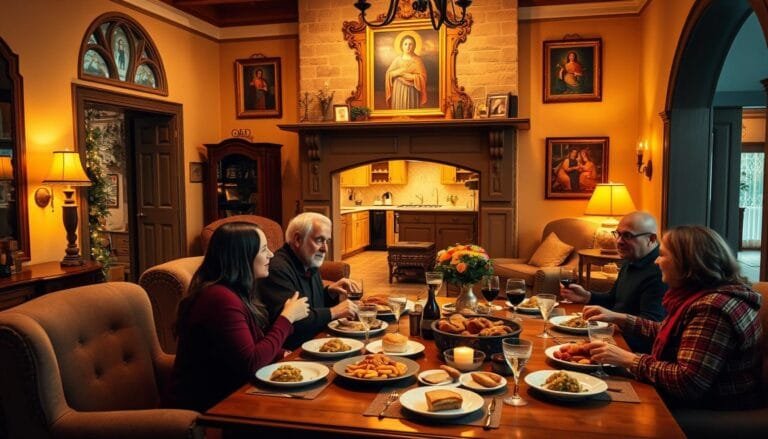Nurturing Faith: A Guide to Teaching Catholic Kids
This website contains affiliate links. As an Amazon Associate, I earn from qualifying purchases. The content on this website was created with the help of AI.
Are we giving our children the right tools to face life’s challenges through Catholic teachings? This guide offers strategies for Catholic parenting and faith formation.
We’ll explore ways to instill faith in our children effectively.
Religious education and spiritual growth are vital in shaping our children’s character. They help form a child’s worldview.
Let’s discover how we go about teaching Catholic kids in everyday life.
We’ll learn practical methods to build a strong faith foundation. These skills will benefit our kids as they grow into adulthood.
Key Takeaways
- Consistent prayer practices strengthen family bonds and faith
- Regular Mass attendance creates sacred family time
- Incorporating Bible stories into daily life enhances religious education
- Teaching moral decision-making through a Catholic lens guides children’s choices
- Fostering a personal relationship with Jesus supports spiritual growth
Catholic Parenting Foundations: Building Strong Faith Values
Raising children in the Catholic faith is a sacred duty. Nurturing Catholic values at home creates a strong foundation for spiritual growth.
Our parenting journey involves daily practices that foster a connection with God.
Daily Prayer Practices for Catholic Families
Family prayer is vital in Catholic life. A regular prayer routine helps our children build a relationship with God.
Grace before meals and bedtime prayers create a faith rhythm in our daily lives.
Teaching Traditional Catholic Prayers and Devotions
We introduce our children to prayers like the Our Father and Hail Mary. These prayers connect them to Catholic tradition.
We explain their meaning, helping kids understand their importance in our faith journey.
Creating Sacred Family Time Through Mass Attendance
Regular Mass attendance nurtures love for the Eucharist and our faith. We prioritize Sunday Mass as family worship time. This practice has become a cherished part of our weekly routine.
“The family that prays together stays together.” – Fr. Patrick Peyton
These foundational practices build a home where Catholic values thrive. Our journey has challenges and joys. Yet, it strengthens our faith and family bonds every day.
Nurturing Faith: A Guide To Teaching Catholic Kids
Teaching Catholic kids about faith is a rewarding journey. Various tools can help children grow spiritually. Let’s explore effective ways to nurture faith in young hearts.
Incorporating Bible Stories into Daily Life
Bible stories are powerful tools for teaching important lessons. Read these stories at bedtime or during family meals. This helps kids connect faith with everyday life.
Nurturing faith through stories enhances language skills and empathy in children.
Teaching Moral Decision-Making Through Catholic Lens
Moral decision-making is crucial for Catholic kids. Use real-life situations to teach right from wrong. Discussing moral dilemmas helps children develop critical thinking skills.
This approach allows them to apply Catholic values to their choices.
Developing Virtuous Character in Children
Building virtuous character starts at home. Encourage kindness, honesty, and respect in daily interactions. Serving others as a family teaches selflessness and empathy.
These activities help shape a child’s character in line with Catholic values.

Fostering a Personal Relationship with Jesus
A personal relationship with Jesus is central to the Catholic faith. Set aside family prayer time to encourage this connection. Read age-appropriate Bible stories and discuss Church teachings.
Learning about saints can inspire children to live out their faith.
| Faith Practice | Impact on Children |
|---|---|
| Family Bible Reading | Enhances spiritual growth |
| Praying Together | Strengthens family bonds |
| Serving Others | Develops empathy and selflessness |
| Celebrating Rituals | Reinforces Catholic traditions |
These practices create a nurturing environment for Catholic kids. They help children grow in faith and make sound moral decisions.
Kids develop virtuous character and build a strong relationship with Jesus.
Conclusion: Raising Faith-Filled Catholic Children
Nurturing Catholic family life requires dedication and love. Spiritual formation is crucial for raising faith-filled children.
A study shows that 78% of Catholic parents believe passing on their faith is essential.
We’ve explored various Catholic family practices that foster spiritual growth. These include daily prayer routines and active parish involvement.
Families who pray together often raise children with stronger faith foundations.
Building a vibrant Catholic community supports families in their faith journey. Participating in parish activities and celebrating feast days create a nurturing environment.
Fostering relationships with other Catholic families also helps children’s faith flourish.
Our actions speak louder than words when practicing our faith. Consistently living our beliefs is the most powerful way to pass them on.
This approach creates a lasting impact on our children’s spiritual development.
Let’s embrace the responsibility of raising faith-filled Catholic children. By incorporating these practices, we’re not just teaching faith – we’re living it.
Together, we can create a legacy of love, faith, and service.






